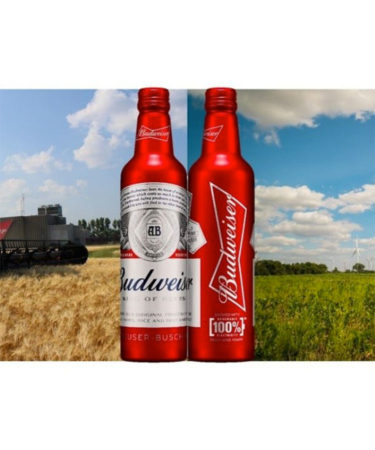On Tuesday, April 17, Anheuser-Busch announced its U.S. sustainability goals for 2025. This came hot on the heels of the worldwide sustainability goals it announced in March, and its 2017 vows to pursue renewable resources. Also in 2017, AB InBev’s “Elevate” platform outlined sustainability goals for 2018.
Its newly outlined ambitions cover four categories: renewable electricity and carbon reduction; water stewardship; smart agriculture; and circular packaging. All Budweiser products will also get a “100% Renewable Electricity” symbol, which will make its debut on U.S. packaging as of Earth Day, April 22.
In other words, AB cares. It’s green. Greener than green. Greener than you, me, or any other brewery. But, hold on.
I have nothing bad to say about this, really, but I do feel the need to point out that, although AB can do things the biggest, there are many smaller brewers that have been taking on sustainability challenges for several years.
Sierra Nevada has devoted staff and resources to sustainability efforts for decades — most notably, the brewery created sustainable brewery benchmarks when it designed its East Coast location in Mills River, N.C., which includes thousands of photovoltaic solar panels; stormwater management and water treatment facilities; and forest restoration. The Mills River brewery was the first U.S. production brewery to receive Leadership in Energy and Environmental Design (LEED) certification at the platinum level, the highest level awarded to LEED-certified facilities.
Hopworks Urban Brewery (HUB), a certified B Corporation based in Portland, Ore., is on the board of Salmon Safe, is a member of One Percent for the Planet, and has incorporated sustainable brewing practices in its operations since launching in 2008. HUB even brewed a beer that’s good for the climate —Long Root Ale, a pale ale made with organic ingredients and an ancient perennial grain called Kernza, and aided in the Land Institute’s efforts to employ Kernza’s earth-benefiting properties, like reducing water use, pulling carbon dioxide from the atmosphere into soil, and preventing soil erosion.
Likewise, New Belgium Brewing, also a certified B Corporation, based in Fort Collins, Colo., was one of the first wind-powered breweries in the country, and also diverts almost all of its waste from landfills; has achieved significant water-use reduction; and focuses a large effort on getting employees to bicycle to work.
I’m not saying AB’s efforts aren’t admirable. They are. But the big guy can afford a larger piece of the sustainability pie. Doesn’t everyone deserve a seat at the table?
Shmaltz Brewing Teams Up With Artisanal Imports to Expand Nationwide Sales and Distribution
Shmaltz Brewing of Clifton Park, N.Y. announced this week that it has partnered with Artisanal Imports, an importer and sales and marketing engine. The partnership will double nationwide sales staff and expand distribution beyond the brewery’s existing 30-state network.
Jeremy Cowan, founder and owner of Shmaltz Brewing, most famous for its He’Brew beer, said in a press release: “We’re stoked to be partnering with Artisanal Imports and to be bringing lots of tasty, award-winning beer to many more parts of the country. This partnership allows us to continue my unorthodox business model of wide, wide, wide…and a little deep at home too. We’ll have new blood to hit the streets and the beer will be more available to the tribe across the country. What more could we want?!”
“We are excited to partner up with Shmaltz,” Sean Knoll, Artisanal Imports president, said. “I have known Jeremy Cowan since the beginning and have always admired his work ethic and his drive to create and maintain He’brew Beer. Nobody does it like Shmaltz! We share a great many distributor and retail customers already, so this partnership will allow both of us to strengthen those relationships.”
In a sea of fierce competition and “pay to play” schemes (including one Shmaltz was involved in last year), this kind of warms our hearts. It’s not the sexiest part of craft beer, but good sales partnerships and trusted distributorships are so important, especially as the landscape continues to get rockier for the little guys.
Craft Beer’s New Move Is… Not Expanding
Against the Grain, a brewery based in Louisville, Ky. with a production facility in Germany, has decided not to open its planned third location in Louisville.
Deschutes Brewery, based in Bend, Ore. with an additional facility in Portland, Ore. and a taproom in Roanoke, Va., has decided to put the breaks on plans to break ground on a new production facility in Roanoke.
We called it. These brewers are responding to the state of the industry, which in recent months has provided copious evidence that expanding too far, too quickly is no bueno for a small brewery. The hesitation here — though probably extremely disappointing for these two brewers — is ultimately a good call.
Next, we’ll wait for Green Flash to back out of its New Mexico deal.
